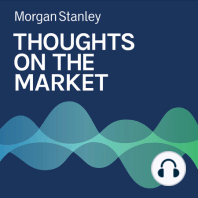3 min listen

Sustainability: Tech Transformation in the Education Market
Sustainability: Tech Transformation in the Education Market
ratings:
Length:
10 minutes
Released:
May 12, 2023
Format:
Podcast episode
Description
With technology evolving rapidly in education, investors are taking a closer look at how it will financially impact the global education market. Stephen Byrd and Josh Baer discuss.----- Transcript -----Stephen Byrd: Welcome to Thoughts on the Market. I'm Stephen Byrd, Morgan Stanley's Global Head of Sustainability Research. Josh Baer: And I'm Josh Baer from the U.S. Software Team. Stephen Byrd: On the special episode of the podcast will discuss the global education market. It's Friday, May 12th at 10 a.m. in New York. Stephen Byrd: Education is one of the most fragmented sectors globally, and right now it's in the midst of significant tech disruption and transformation. Add to this, a number of dynamically shifting regulatory and policy regimes and you have a complex set up. I wanted to sit down with my colleague Josh to delve into the intersection of the EdTech and the sustainability side of this multi-layered story. Stephen Byrd: So, Josh, let's start by giving a snapshot of global education technology, particularly in this post-COVID and rather uncertain macro context we're dealing with. What are some of the biggest challenges and key debates that you're following? Josh Baer: Thanks, Stephen. One way that I think about the different EdTech players in the market is through the markets that they serve. So in the context of education, that means early learning, K-12, higher ed, corporate skilling and lifelong learning. The key debates here come down to what it usually comes down to for equities, growth and margins. So on the growth side, there's several conversations that we're constantly having with investors. Some business models are exposed to academic enrollments as a driver. To what extent would a weaker macro with higher unemployment lead to stronger enrollments given their historical countercyclical trends? And enrollments have been pressured as current or potential students were attracted to the job market. And on the margin side, some of the companies that we follow in the EdTech space, they're the ones that were experiencing very rapid growth during COVID and investment mode to really capture that opportunity. And so investors debate the unit economics of some of these business models and really the trajectory of margins and free cash flow looking ahead. One other more topical debate, the impact of generative A.I. on education, and maybe we'll hit on that topic later. Josh Baer: Stephen, why do these debates matter from the point of view of ESG, environmental, social and governance perspective? Why should investors view global education through a sustainability lens? Stephen Byrd: Yeah Josh I'd say among sustainability focused investors, typically the number one topic that comes up within the education sector is inequality. So higher education is a key pillar of economic development, but social and economic problems can arise from limited access. Unequal access to education can perpetuate all forms of socioeconomic inequality. It can limit social mobility, and it can also exacerbate health and income disparities among demographic groups. It can also restrict the potential talent pool and diversity of backgrounds and ideas in different academic fields, leading to all kinds of negative economic implications for both growth and innovation. While progress has been made in increasing enrollment among underrepresented students, significant disparities remain in admission and graduation rates. For investors and public equities, I think one of the more useful tools in our note is a proprietary framework that measures sustainability impact. Now that tool is really primarily rooted in the United Nations Sustainable Development goal number four, which lays out targets in education. This framework is rooted in the premise that I mentioned earlier. The COVID-19 pandemic has exacerbated multiple challenges in education. So when we think about business models that we really like, we're focused on models that can improve the quality
Released:
May 12, 2023
Format:
Podcast episode
Titles in the series (100)
Mike Wilson: Are U.S. Economic Indicators Flashing Yellow? by Thoughts on the Market